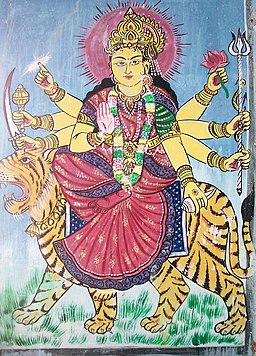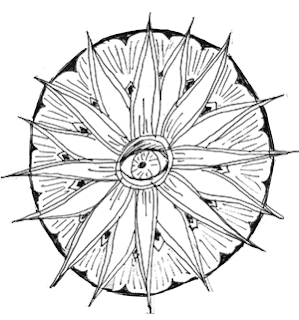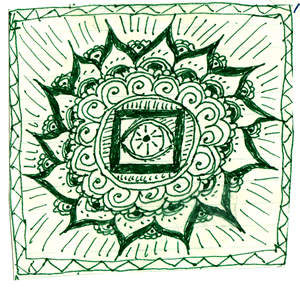For the first part of this story, check out my guest post on The Pagan Princesses where I talk about my first brush with the divine, from the perspective of five years after.
In recent years, with the advent of my marriage and the birth of my child, it seemed as if I had backslid in my spiritual development. I stopped meditating regularly, and just kind of coasted on the faith of what I had experienced before. But during my pregnancy, and when I was suffering from postpartum depression I felt profoundly isolated and alone; I felt abandoned. I still thought God was there, but it was as if It couldn’t reach me, or I couldn’t hear It.Now I am again at a crossroads in my life. Stress and questions about my identity have driven me back to meditating, back to actively seeking. Five years have passed since my spiritual awakening, and while I still have faith that what I experienced was authentic, that sense of being connected to the source of being has faded leaving only memories and occasional flashes of insight.
As I rediscover and reconstruct my faith, it is clear to me our experience of the Eternal changes as our lives change. When I had my awakening I was unmarried, childless, and between careers. There was a lot of room for God to slip in and make Itself known to me. The Buddhist practice of non-attachment also seemed to make a great deal of sense when my life was in this in-between place.
Now I am a mother, and am totally, inexorably, tethered to this world and this life by my child. Accepting impermanence is so much harder when there is someone in the world whose existence is so crucial to me. When I first started meditating again, I couldn’t understand why it was so difficult. Why was it so hard to let go of my attachments for a little while and just breathe? It is because there is someone in my life whose breath is more important to me than my own. To get a little Pagan on you, I have passed from the Maiden phase of my life into the Mother phase, which I believe is by its nature profoundly attached. In Buddhism, non-attachment means accepting things like sickness and death. As a mother I find that pretty much impossible. I cling; I worry. I entered this phase relatively late, with a strong sense of identity — which motherhood blew to bits. What is the tradeoff for losing my ability to detach? Love. Mind-bending, terrifying, overwhelming love. The ability to love with a ferocity and depth and selflessness I did not have before becoming a mother. And I think that accepting my love, rather than my fear, is the path I need to follow to reconnect with my Spirit.
As I revisit the teachings that resonated with me before, I am also exploring the polytheistic aspects of Hinduism. The Hindu religion is incredibly diverse and varied. Sri Ramakrishna, a Hindu prophet or “Avatar” from the late 19th century was the father of modern Vedanta. He was one of those people with a direct line to God, which made him a little crazy. He was able to reach the divine through almost any path. He could meditate on Kali, or Christ, or Krishna, or just on the breath itself, and ecstatically merge with God. (He also thought he was a monkey for a while. I’m glad I’m not a prophet.) So as I reconcile myself to the changes that motherhood has brought, I find myself looking more to the Hindu goddesses for identification. In the West, female archetypes are very strictly broken up into Maiden, Mother, or Crone. They tend not to share traits – you are in one phase or the other. Remember when Hillary Clinton got all that flack for not wanting to “stay home and bake cookies”? Our society is not so great at accepting that a powerful, intellectual woman can also be a nurturing, devoted mother.
The Hindu goddesses are much more complex. When I contemplate Kali, Durga, or Saraswati, I feel more at peace with the multiplicity of my own experience as a woman. I also have taken some inspiration from the Princesses and spent more time communing with my grandmother who passed away shortly after I was married. I’m learning that fluidity and flexibility are traits of the Goddesses, and my birthright as a woman. I find the fullness of contemplation is as useful as the spaciousness of meditation, and I can pass between them as I wish. Goddesses are all about transformation, and I am starting to allow myself to transform.I will enter yet another phase of my life in the coming year – I am starting a Doctoral program. And while I can’t always look into the sky and see God, certain things resonate in my body and heart in an unmistakable way. This path, the path of the scholar, feels incredibly right to me. Looking into my daughter’s eyes or holding her hand feels as if a hot, beautiful, painful beam of light is penetrating my heart and connecting me to all the mothers and daughters before me. Meditation soothes my soul helps me be more compassionate.
The emptiness of Shambala doesn’t resonate with me as much as the fullness of Vedanta, although the practice of Shamatha meditation is still a good exercise for my busy mind. The Mother phase of my life seems the most tied to gender. I think God is still speaking to me, but that voice is now more female and urges me to embrace my own womanhood fully. Her voice sounds a lot more like my own. In Hinduism, there is a branch called Shaktism, where the highest form of Brahman stems from the feminine instead of the masculine. It is still practiced widely in India and elsewhere, and I find this idea entrancing. In the end, I hope I can be a little like Ramakrishna – that I can find Spirit through many different paths, depending on where I am in my life. That I can be a little less rigid, and a little more fluid with how I connect to my source, and to the people I love.




